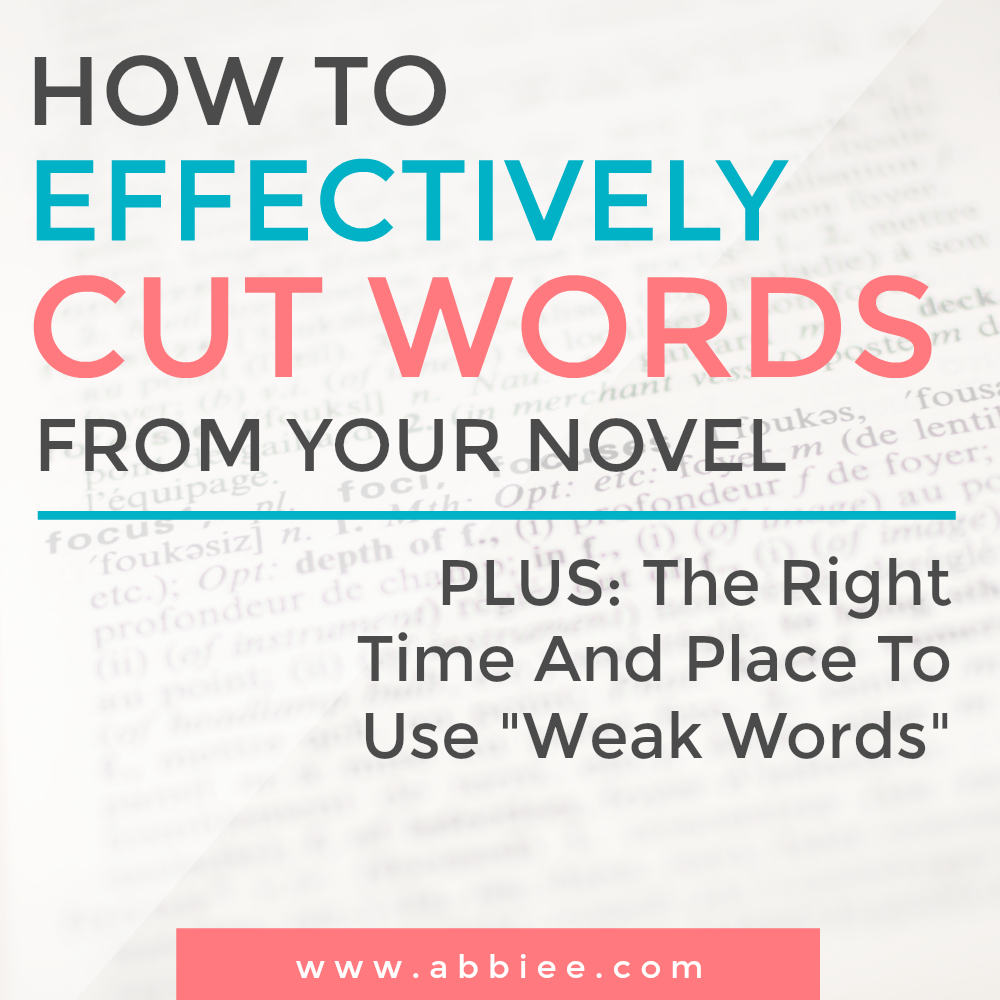EDITING: The stage of the writing process that all writers would be much happier without. Why do we have to edit our books? Can’t we just smash our keyboards and end up with 357 pages of sheer brilliance ready to hit the press? NOPE.
Unfortunately, every book needs editing. Every first draft is full of words that need revising, rewriting, editing, and yes sometimes DELETING. You hear about it all the time: how you need to cut words! But before you get trigger-happy with your delete key, it’s important to take a step back and actually come up with a plan for cutting words out of your book. Because every writer looks at their own work subjectively — it’s impossible not to. And every writer hates their own work at some point and thinks it’s total rubbish and EVERY WORD DESERVES TO DIE A SLOW AND TERRIBLE DEATH. But this is simply not true!
Words are all you have* so BE A LITTLE NICER TO THEM. Chances are, your first draft is BURSTING WITH POTENTIAL and it’s not half as awful as you think it is. So don’t grab your word-slaying machete and let out your frustration on your innocent first draft! It will only end in tears. That’s why today’s post is all about: HOW TO EFFECTIVELY CUT WORDS. What words you should ACTUALLY put to death and why…and the right time and place to actually use “weak words” to your advantage. LET’S GO.
*scary revelation right there…what are we? writers! what do we have? um…words…! [distant sobbing]
WORDS THAT DESERVE TO DIE
A while ago, I went on a huge editing-research spree and collected “weak words” from dozens of articles and blog posts and videos — then I compiled them into a giant list in my notebook and every time I sit down to edit a novel, I’m on high alert for these words and ready with my machete to chop them. I’ll list them one by one here, with the times you should cut them and the times you should keep them.
PLEASE NOTE: when I cut these words, I totally disregard the times they appear in dialogue. I love realistic character voice and people in real life don’t always use perfect words when they speak — so if there’s a weak word in dialogue, don’t worry about it! This guide is to help you strengthen your prose.
SUDDENLY
USE THIS WORD SPARINGLY! Here’s my rule of thumb: the only time you should use “suddenly” is when something is actually SUDDEN. It’s almost like speeding up the “film” your reader is watching — surprising them with a turn of events that nobody saw coming. It makes sense that if you use this word too much, you lose your element of surprise. Like the boy who called wolf. Suddenly we don’t suddenly care about anything happening suddenly because EVERYTHING HAPPENS SUDDENLY.
Here’s an example where I could cut this word from my own writing:
Gregory returns surprisingly soon. He emerges from the trailhead, all loose-limbed and tall and carefree. He looks up and smiles when he sees me.
“No luck?”
I shrug one shoulder, suddenly realizing that I didn’t even think of an excuse to give him.
If “suddenly” was removed from that sentence it could maybe read something like this:
I shrug one shoulder, and a realization hits me: I didn’t even think of an excuse to give him.
MUCH BETTER. Now what are the times we should actually keep this word? When something is sudden enough to throw off your character — and thus, throws off your reader.
Suddenly, an even more frightening thought strikes me—and makes my heart stop beating.
Aha! This is a perfect use of the word “suddenly.” Why? Because a frightening thought just came out of left field and slapped my protagonist upside the head.
THEN
Then, then, then. IS THERE ANYTHING MORE BORING THAN THE WORD “THEN”?? Yes. Passive voice. But that’s another post for another time. The problem with “then” is simple: it’s filler. We know that one thing happens, THEN another thing happens.
Here’s an example where I could cut this word from my own writing:
He stares at me, blinking as if I’m a ghost. Then he pulls off his headphones, letting them drop around his neck.
LOOK AT THAT “THEN.” There is literally no reason for it to be there. :’)
He stares at me, blinking as if I’m a ghost. He pulls off his headphones, letting them drop around his neck.
Maybe not perfect, but better! The sentence flows without interruptions. When is it perfectly fine to use the word “then”? WHEN SOMETHING ACTUALLY CHANGES. “Then” is a lot like “but” — it’s a bridge between two actions to show how those actions are different from each other. Here’s a good example from another one of my novels:
Trees and sunlight blur around me, then give way to a clearing.
Here I’m describing the scenery changing, so it works just fine. In fact, if I deleted “then” from this sentence, it would sound weird… I would have to use something like “and” instead so WHAT’S THE POINT OF DELETING “THEN” IN THE FIRST PLACE??
VERY/REALLY
We all know the rule: don’t say you’re very tired, say you’re exhausted. This is all fine and good and I’M ALL FOR USING STRONG WORDS IN YOUR NOVEL. Because using a weak word with “really” or “very” tagged onto the front doesn’t make it any better:
Here’s an example where I could cut this word from my own writing:
To be honest, I hadn’t really thought about the possibility. I still don’t think about it. What a stupid idea.
AGAIN, NO POINT FOR THAT WORD TO BE THERE let’s just delete it shall we.
To be honest, I hadn’t thought about the possibility. I still don’t think about it. What a stupid idea.
BETTER. But is there a right time and place to use “really” and “very”? YES. Use it in instances like this: the very next day, the very front, the very back, the very edge, really there, really happening, really consider, etc. Basically, follow your instincts because this is a hard one to gauge. But here’s a sentence where it works just fine:
I try to find a way to thank him without really thanking him at all.
Be careful with this one! I know it seems like it’s never necessary, but sometimes it adds flavor and you should just LEAVE IT ALONE, RODNEY. Somebody’s gonna have to take that machete away from you in a minute.

IS/WAS
Technically, this is passive voice. Telling and not showing. Whenever you tell me something that IS or WAS, there is no action attached to it. “The sky was blue” or “the sun is shining.” It feels flat because it is flat — not a whole lot going on.
Here’s an example where I could cut this word from my own writing:
“No, you don’t!” Now I’m losing it, too. My throat is tight as I force the painful words out. “You don’t know me.”
Here’s the cool part: if I take out the “is” I’m basically forced to give the sentence more action.
“No, you don’t!” Now I’m losing it, too. My throat tightens as I force the painful words out. “You don’t know me.”
Believe it or not, there are some instances where it’s actually GOOD to tell instead of show. When you need to deliver information to the reader quick and seamlessly, without slowing down the action of the scene. Like this:
The closest mall is fifty miles away, so it’s never a frequent outing.
It would be kind of ridiculous to spend time making that an active sentence, like “the closest mall sits in a town fifty miles away.” It would sound tedious and wouldn’t contribute anything to the scene. SO YOU SEE, SOMETIMES TELLING IS OKAY. (I could write a whole post about this maybe I will sometime.)
STARTED
Don’t start to do something. JUST DO IT. There are very few instances where the term “start to” is necessary.
Here’s an example where I could cut this word from my own writing:
Despite the murmur of the party guests and the muted chorus of an old Christmas album that has started playing, the room is quiet to my ears.
That sentence isn’t bad, but it’s a little muddy.
Despite the murmur of the party guests and the muted chorus of an old Christmas album playing in the background, the room is quiet to my ears.
So when can we say something “started”? WHEN SOMETHING ACTUALLY STARTED. Especially when a character starts to do something, but doesn’t actually finish.
Then one of the kids started clapping. Then another. Before I knew it, the whole classroom was loud with applause.
PERFECTLY FINE I HAVE NO PROBLEM WITH THAT. Other times this might be applicable is something like “it was starting to rain” or some other common phrase that delivers information quickly when you don’t want to beat around the bush with descriptions.
JUST
*nervous laughter because if anyone should be punished for using the word “just” too much, it’s me* JUST IS ONE OF THOSE WORDS THAT’S REALLY EASY TO OVERUSE. It’s just so convenient, you know? But most of the time, it’s completely unnecessary.
Here’s an example where I could cut this word from my own writing:
When I open my eyes again, Gregory is just smiling and shaking his head.
UGH!! LOOK AT IT! There’s no need. Let’s cut that word. And while we’re at it, let’s delete the “is” too.
When I open my eyes again, Gregory smiles and shakes his head.
Ah, yes. Much better. But now of course you’re wondering: is there a right place and right time to use “just”? Yes. But it’s a little tricky so you have to play it by ear. Basically, ask yourself: will it still make sense if I delete “just”? Ninety-nine percent of the time, the answer is yes. But there’s that one percent, too:
Some part of me wants to forget about everything for just a couple of hours.
So take your time with cutting the word “just” — I know it seems like the evilest of words and deserves to die, but NOT ALWAYS. GIVE IT A FAIR TRIAL.
SOMEWHAT/SLIGHTLY
This is like the “find a stronger word” rule except it’s the other way around. If a character does something slightly or somewhat, the word you’re using is probably too strong for the scene.
Here’s an example where I could cut this word from my own writing:
“Now, plan b.”
Jerome looks slightly terrified. “What’s plan b?”

STRONG WORD MUCH?? Yes. What I’m trying to describe here is mild apprehension. Nothing like terror.
“Now, plan b.”
Jerome glances up at me, eyes wide. “What’s plan b?”
That makes a little more sense, doesn’t it? Oftentimes you can remove the word “slightly” altogether and it reads just fine. Like “he leaned back slightly” can become “he leaned back”. It’s not an important detail so it doesn’t really matter if it’s a slight gesture or a full gesture. You can also use “slightly” and “somewhat” in a sentence when there’s no weaker word to describe what you see:
I feel somewhat guilty, doing nothing to help while he makes the popcorn and starts the movie.
Yes, what my protagonist is feeling is guilt — but she doesn’t feel as guilty as she would if she hit a dog with her car. So somewhat actually works here.
SOMEHOW
MISSING INFORMATION?? Using the word “somehow” is a mark of lazy writing. Even if you weren’t trying to be lazy when you wrote it, unfortunately it comes across that way. The reader feels like they missed something — and they did, because there is a missing link in your chain of information.
Here’s an example where I could cut this word from my own writing:
Nancy had her back to him, stirring cream into her coffee at the counter. But she somehow heard his footsteps on the stairs, even over the noise.
SO HOW EXACTLY DID SHE HEAR OVER THE NOISE? Does she have super amazing hearing capabilities? Somehow isn’t necessary. We all know how a person hears things. Let’s just cut this word!
Nancy had her back to him, stirring cream into her coffee at the counter. But she heard his footsteps on the stairs, even over the noise.
When is it okay to say “somehow”? When the CHARACTER is missing information. I’m a big supporter of writing in deep POV, never leaving the protagonist’s mind for a moment, and seeing everything through THEIR lens. So if they don’t know all the information (and they won’t, because nobody knows everything) it’s perfectly fine to say somehow:
My bedroom door opens, and I can somehow sense that it’s Grandma.
My protagonist is blind, so she doesn’t know who just opened her bedroom door — but she knows her grandmother so well, she can just sense when she’s in the room. That’s a perfectly fine use of this word.
SEEM
SHOW DON’T TELL — it’s still an important principle to write by. And chances are, if you’re using the word “seem” to describe something, you’re just weaseling your way out of action. Yes, the POV character is perceiving something, but HOW EXACTLY are they perceiving it?
Here’s an example where I could cut this word from my own writing:
“We can drop you off at the park, you can rejoin your class, and we’ll head into the woods to film.”
She still seems apprehensive, but only replies, “Sounds like a plan.”
How does she seem apprehensive? What exactly is my protagonist noticing about her that screams apprehension? I don’t know. The reader doesn’t know. NOBODY KNOWS. So let’s fix it:
“We can drop you off at the park, you can rejoin your class, and we’ll head into the woods to film.”
She hesitates, rubbing the side of her neck. “Uh, sure. Sounds like a plan.”
Nothing a little nervous body language can’t fix! OH YEAH. But sometimes it’s okay to use “seem” — such as when the POV character knows something without knowing HOW they know it…they just have a feeling about it.
Although I shouldn’t judge, I can’t help but notice that her friendliness seems insincere.
DEFINITELY
Definitely is pretty useless. It’s like the narrator insisting that what they believe is true — but in a totally dry, muddy way that just makes it harder to read the sentence.

Here’s an example where I could cut this word from my own writing:
Mia lives in Beverly Hills. She’s definitely a spoiled rich girl at heart, but the kind who thinks she’s edgy and grunge because she wears backwards snapbcks and has a nose-ring.
LOOK HOW USELESS IT IS. Look how you don’t even notice when I delete it:
Mia lives in Beverly Hills. She’s a spoiled rich girl at heart, but the kind who thinks she’s edgy and grunge because she wears backwards snapbcks and has a nose-ring.
When is it okay to use “definitely”? When the character was previously unsure about something but now they are convinced.
She’s smiling again.
And it’s definitely the most beautiful thing I’ve ever seen.
Earlier on in this scene, my protagonist described her smile as “probably the most beautiful thing I’ve ever seen” so it’s almost poetic to circle back around and say definitely. There are other times when this word is 100% okay to use so FOLLOW UR GUT.
ADVERBS
I know, I know — this is a bit trickier because it’s not a specific word. By adverbs, I mean anything ending in “ly.” It’s one of the more subtle ways passive voice sneaks into your writing.
Here’s an example where I could cut adverbs from my own writing:
Miss Jo smiles sympathetically. “Of course we forgive you—”
“Speak for yourself,” Mom cuts her off bitterly, turning away from us both.
Miss Jo gives me a sympathetic smile. “Of course we forgive you—”
“Speak for yourself,” Mom snaps, turning away from us both.
CONCLUSION
Don’t go too crazy when you cut words from your novel. Yes, it’s good to tighten up your prose and create a smoother reading experience — but you can also edit your novel FOREVER. So you have to just do your best and decide when enough is enough. Happy word-chopping!
TALK, BRO
I KNOW THIS POST IS RIDICULOUSLY LONG but I hope it has helped you! Let’s chat in the comments: what does your editing process look like? How do you cut words from your novels? GIVE ME ONE GREAT EDITING TIP IN THE COMMENTS BELOW!









